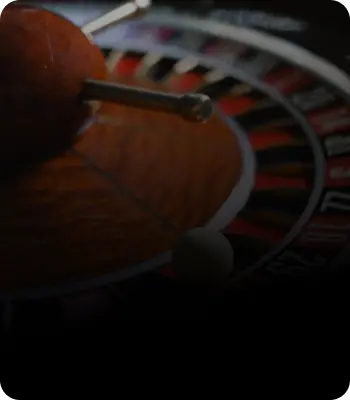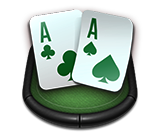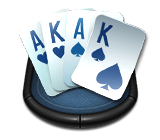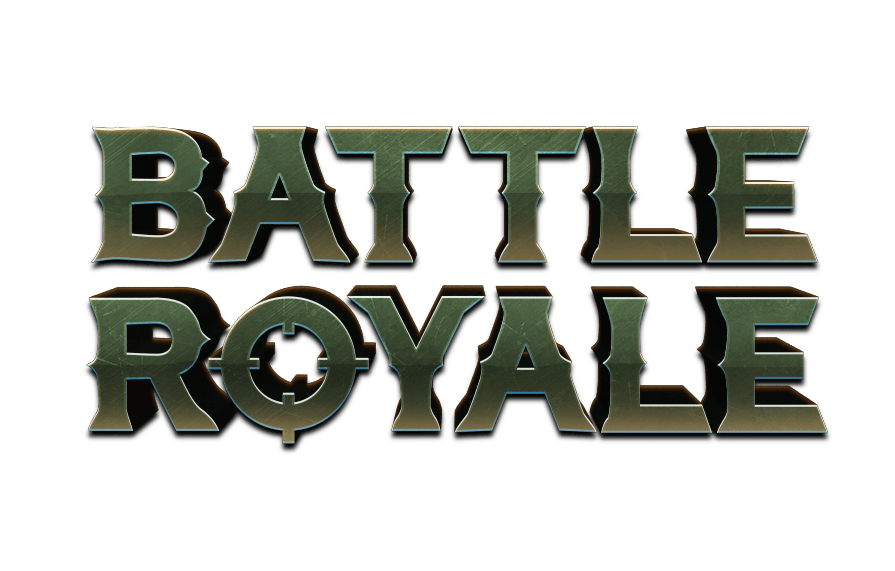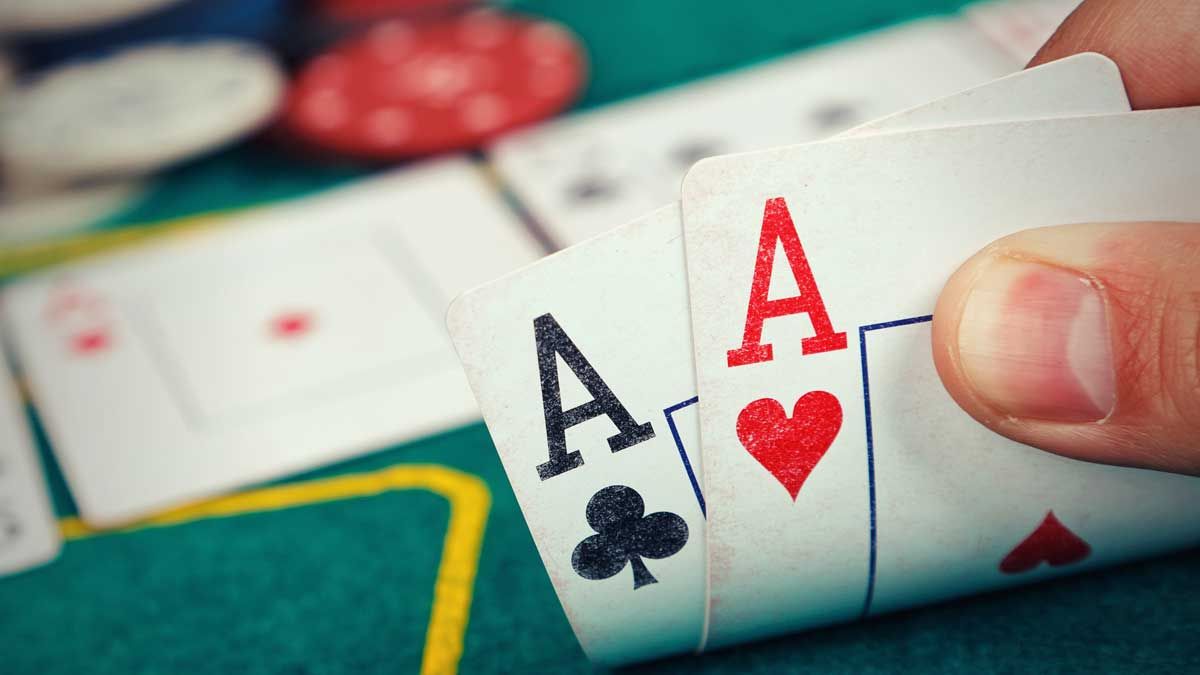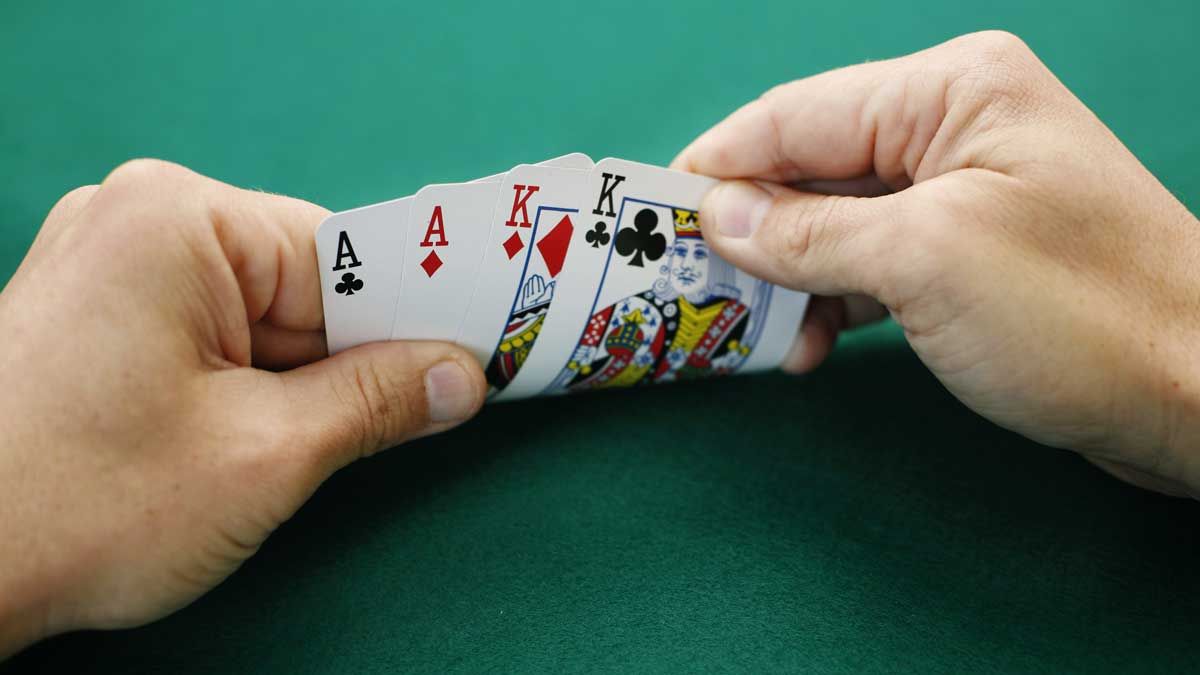
If you want to know the best Omaha poker hands, you’ve come to the right place. We’ve compiled this guide to help newcomers to the world of Pot Limit Omaha get started on the right path.
We’ll first reveal the top 20 starting hands in PLO, before discussing more advanced concepts like danglers and blockers. Plus, we’ll explain the differences between hand selection in PLO and Texas Hold’em.
What Are the Best Starting Omaha Hands?
We’ll delve into the details shortly, but first, here’s a list of the 20 best starting Omaha hands.
| 1 | A-A-K-K | 11 | K-Q-J-T |
| 2 | A-A-J-T | 12 | K-K-T-T |
| 3 | A-A-Q-Q | 13 | K-K-A-Q |
| 4 | A-A-J-J | 14 | K-K-A-J |
| 5 | A-A-T-T | 15 | K-K-A-T |
| 6 | A-A-9-9 | 16 | K-K-Q-J |
| 7 | A-A-x-x | 17 | K-K-Q-T |
| 8 | J-T-9-8 | 18 | K-K-J-T |
| 9 | K-K-Q-Q | 19 | Q-Q-J-J |
| 10 | K-K-J-J | 20 | Q-Q-T-T |
Keep in mind that these are all double-suited hands. For instance, A-A-K-K might be A♣ A♦️ K♣ K♦️ or A♠️ A♥️ K♠️ K♥️.
Tips For Playing the Best Omaha Starting Hands
The first thing you need to know about Omaha is that there are many more combinations of hands than in Hold’em. In fact, there are 16,432 starting hands you could receive, compared to just 169 in No Limit Hold’em.
With so many possible holdings, pocket pairs are far less valuable in this game compared to Hold’em. Although A-A-K-K is the strongest hand, you’ll notice that many of the 20 best hands in Omaha are actually combinations like A-A-J-T. That’s because these connected holdings offer much more potential to make the nut flush, nut straight or a full house.
Omaha Starting Hands and Equity
It’s important to note that Omaha starting hand equity is much more widely spread than in Hold’em. For instance, a pocket pair of Aces has an approximate edge of around 66% against two Kings in Hold’em. The bullets will triumph about 83% of the time, compared to 17% for Kings.
But the two best Omaha hands are much closer together. A-A-K-K only beats A-A-J-T around 33% of the time, with a 41% chance of a chop. That’s an advantage of just 6% to 7%.
Why is this relevant? Well, no matter what Omaha starting hand combinations are involved, it’s rare to see one play crushing another. If you have more than 60% equity against your opponent’s hand, you’re in a pretty unusual spot. So even if your Omaha game is watertight and you’re a top player, you’re going to endure some wild swings.
Variance and Omaha
You can attempt to manage the variance in Omaha by combining these three important factors:
Strict hand selection. It’s important that you only play the best Omaha hands because it’s just too hard to consistently come from behind. Being extremely tight in your hand selection will reduce the number of times you get it in behind.
Betting for value. It’s hard to ever have a massive edge, even with a strong hand pre-flop. So you’re going to need to push a lot of thin post-flop value bets. You’ll come up against a lot of inexperienced Omaha players that call too often. So punish them and make sure to get the maximum value possible.
Minimise your losses. You’re going to get it in ahead and lose more often in Omaha than in Hold’em. So keeping the inevitable losses small with good pot control is crucial.
Avoiding variance in Omaha is impossible. So learn to embrace it and try to make it work in your favour as much as you can.
More About Omaha Starting Hand Selection
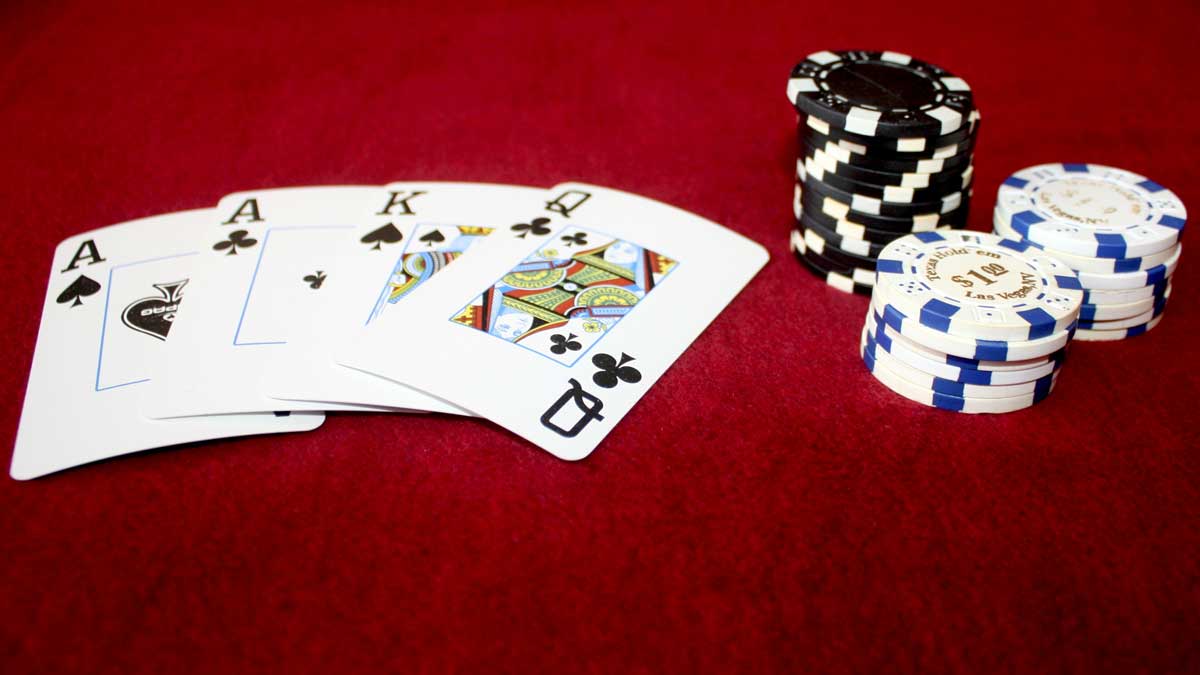 Okay, we’ve established that it’s critical to only play the strongest pre-flop holdings. And we’ve already revealed the top 20 Omaha poker hands. But what exactly makes these hands so good?
Okay, we’ve established that it’s critical to only play the strongest pre-flop holdings. And we’ve already revealed the top 20 Omaha poker hands. But what exactly makes these hands so good?
It’s time to talk about the anatomy of the best hands in Omaha Poker.
Four Cards Working Together
First of all, the perfect Omaha hand has four hole cards that all work together. With two additional cards compared to Hold’em, you’re looking at many more possibilities to pick up draws.
Hands that work well together are some of the most powerful in the game. They open up nut flush and straight draws, along with full houses and sets. So as a general rule, rainbow hands (those made up of different suits) are no good.
Danglers
With that in mind, the best Omaha poker hands do not contain what is known in the game as “dangler”. This refers to a card that’s not contributing anything to the rest of the hand. Imagine being dealt something like A♥️ K♥️ Q♦ 7♠️, for example. Is this a good hand?
Well, your suited A-K gives you nut flush and straight opportunities, as well as the top two pairs. The presence of a Queen further strengthens your straight, pair and kicker potential. All good so far. But then you have the 7♠️, which adds absolutely no value whatsoever. This is a dangler.
But the question is, should you play this hand? In truth, it depends. If you’re an experienced player in a late position and there’s a chance to steal the blinds, you can certainly make a case for it. But for the most part, it’s safer to simply fold hands containing danglers. After all, as we mentioned earlier, we should be looking to minimise our losses by choosing only the best Omaha poker hands pre-flop.
Blockers
When we talk about blockers in Hold’em, we’re referring to a card in your hand that makes it harder for your opponent to win. But in Omaha, the term can refer to a card in your hand that hinders your own opportunity to pick up the pot.
You’ll notice that none of the best Omaha poker hands pre-flop contain more than a pair. A hand like A-A-A-K for instance is extraordinarily weak. Because you can only use two cards from your starting hand, the third ace is redundant.
But not only that, it’s one less Ace left in the deck to turn your pocket pair into a set. So it’s worse than useless; it’s actively working against you to prevent you from improving. That rogue Ace is said to be a “blocker”. Any combination of Omaha hole cards containing trips, or even quads, should go straight to the muck.
Rundowns
Some of the best Omaha poker hands are known as “rundowns”. This is a holding like J-T-9-8 and the best type of rundown is, of course, double-suited.
In Hold’em, we have suited connectors. They are not as strong as the very best starting hands but offer lots of straight and flush potential. The Omaha equivalent is a rundown because these hands flop a lot of wraps.
A “wrap”, or “wrap around” draw is a straight draw that has many outs; up to 20, in fact. If you had J♥️-T♥️-9♦-8♦ on a board of 7♦-6♦-2♥️, just look at the drawing potential. Any T, 9, 8 or 5 completes a straight, giving you 13 outs. You also have additional flush outs, including a straight flush.
Omaha Starting Hand Charts
Hold’em strategists like to put together charts, not just for starting hands but various calling and raising ranges. But when it comes to selecting the best Omaha poker hands, a hand chart is pointless.
With 16,432 permutations - 270,725 if you count the suits separately - any chart would have to be massive. It makes far more sense to just stick to the general principles mentioned in this guide. Choose each hand on its own individual merit, based on the specific situation. But naturally, you should always be playing the 20 best Omaha poker hands listed at the top of the page.
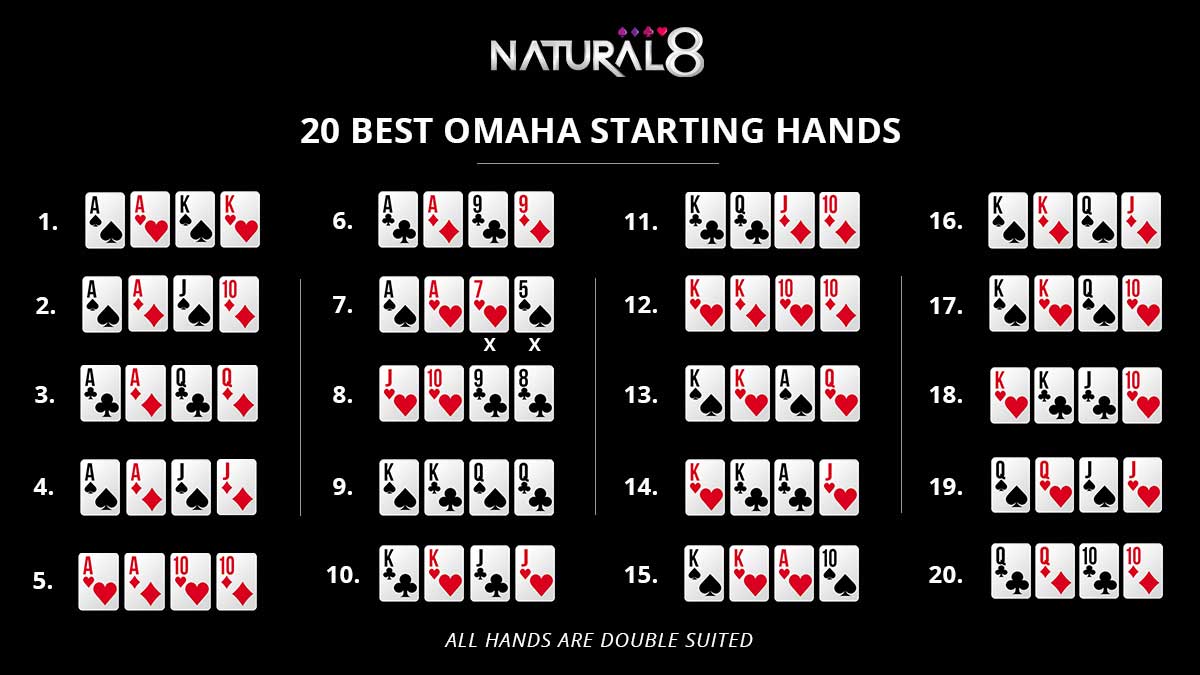
Best Omaha Poker Hands: Conclusion
Omaha is a game of much higher variance than Hold’em, due to the greatly increased number of possible starting hands. As such, it’s important to try and minimise the variance involved. One of the key ways to control this is by tightening up and playing only the best Omaha poker hands.
A strong starting hand is determined by how well connected it is, in terms of straights and flushes. Pocket pairs are good, but they are nowhere near as powerful as in Hold’em. And the worst possible hands are those which contain blockers. You don’t want to be playing hands that contain trips, for instance.
The best combinations are those which combine a premium pair with a bunch of double-suited picture cards. That’s because they flop draws to the nuts, as well as sets, full houses and top two pairs.
Finally, this guide is only relevant to traditional four-card Omaha. The best starting hands in Omaha Hi-Lo, for instance, are entirely different. So be careful not to confuse the two.
Don’t forget to subscribe to our newsletter to get the latest poker tips as well as info on upcoming poker events.













